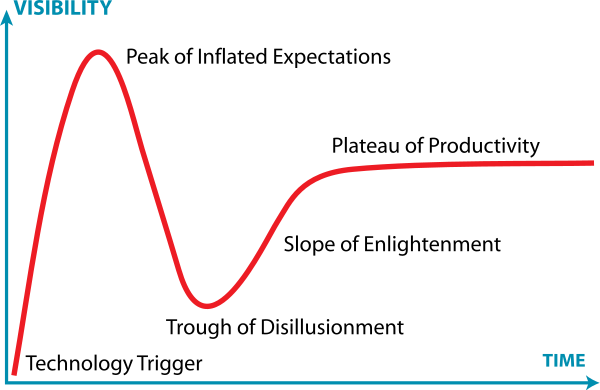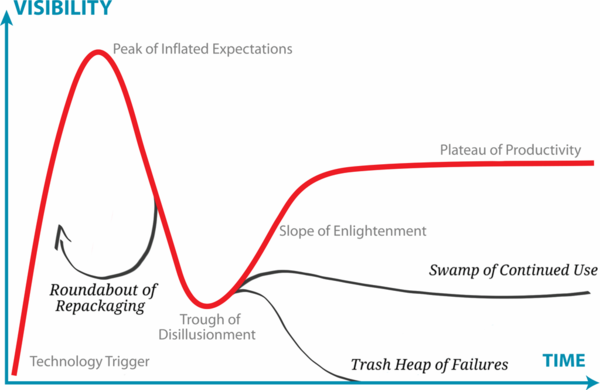Hype cycle: Difference between revisions
mNo edit summary |
|||
| Line 7: | Line 7: | ||
[[File:Hype-Cycle-General.png|thumb|600px|none|A detailed explanation by an anonymous Wikipedia contribuer ]] | [[File:Hype-Cycle-General.png|thumb|600px|none|A detailed explanation by an anonymous Wikipedia contribuer ]] | ||
== The relation to other innovation curves == | |||
The hype cycle curve does not display adoption. Altough there is a relationship, the curve looks very different, i.e. is cumulative until the items drops out of history. | The hype cycle curve does not display adoption. Altough there is a relationship, the curve looks very different, i.e. is cumulative until the items drops out of history. | ||
=== Relationship between hype curve and diffusion models === | |||
* http://linearityofexpectation.blogspot.be/ | |||
=== Items that remain in the curve but do not progress === | |||
[http://algoso.org/author/dalgoso/ Dave Algoso] in the context of ICT for development developed the following curve showing situations where failed technology is still being used. | [http://algoso.org/author/dalgoso/ Dave Algoso] in the context of ICT for development developed the following curve showing situations where failed technology is still being used. | ||
Latest revision as of 18:18, 30 November 2016
Introduction
According to Wikipedia (11/2016), “the hype cycle is a branded graphical presentation developed and used by American information technology (IT) research and advisory firm Gartner for representing the maturity, adoption and social application of specific technologies. The hype cycle provides a graphical and conceptual presentation of the maturity emerging technologies through five phases.”
The relation to other innovation curves
The hype cycle curve does not display adoption. Altough there is a relationship, the curve looks very different, i.e. is cumulative until the items drops out of history.
Relationship between hype curve and diffusion models
Items that remain in the curve but do not progress
Dave Algoso in the context of ICT for development developed the following curve showing situations where failed technology is still being used.
Hype cycles in educational technology
Gartner does produce hype cycles of interest to educational technology, however for copyright reasons these cannot be reproduced as such.
Links
- General
- Hype cycle (Wikipedia)
- In education / educational technology
- Interactive Hype cycle for educational technology (University of Minnesota). This is the best address for hype trending. Various filters can be applied and each item has an attache explanation page.


